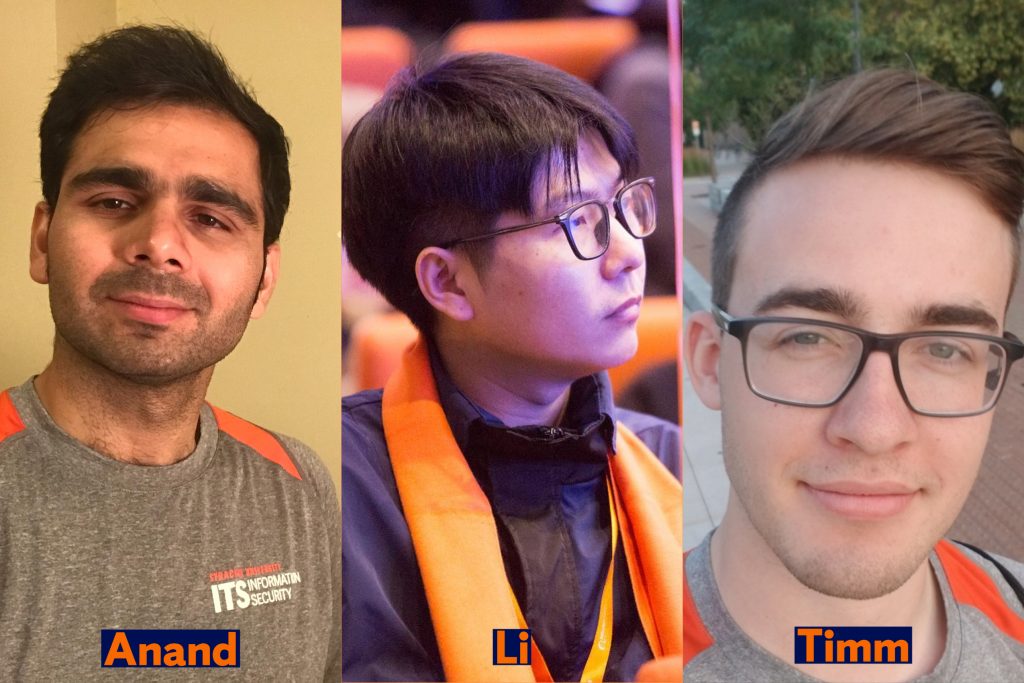While the Syracuse Orange are well-known for their athletic prowess, there’s a new team on campus making noise in cybersecurity competitions. The Sentinels, a team of student-employees from the ITS Security Operations Center (SOC), recently participated in the National Cyber League Spring 2020 Team Game and finished 33rd out of more than 900 competitors.
Ravi Karan Anand, Keyi Li and Griffin Timm have been working together in the SOC since October 2019. Their shared interests and camaraderie led them to enter the National Cyber League as the Sentinels, their team’s name at the SOC.
 “I joined the group back in January 2019, and after the end of that semester, it was just me and two other group members who were staying,” Timm says. “As our group developed more, we became friends, learned new skills from each other and started accomplishing a lot together. This semester, we set out with the goal of competing together at competitions and testing our skills.”
“I joined the group back in January 2019, and after the end of that semester, it was just me and two other group members who were staying,” Timm says. “As our group developed more, we became friends, learned new skills from each other and started accomplishing a lot together. This semester, we set out with the goal of competing together at competitions and testing our skills.”
According to Bob Davis, an information technology architect with the ITS Information Security department who oversees the Sentinels, the SOC offers a sense of community as well as a proving ground for cybersecurity talent.
“The students who work in our SOC come from vastly different backgrounds but what they have in common is their information security interests and that they are genuinely good people,” says Davis. “This group is no different.”
When the group came to Davis with the idea of participating in the National Cyber League, Anand says they were encouraged by Davis’s enthusiastic support. “Bob was ready to come to campus on weekends for the competition if it required the mentor to be present as well,” Anand says.
The National Cyber League tests students’ cybersecurity skills and know-how with a variety of challenges related to forensic data, ransomware attacks and more. The Sentinels took a divide-and-conquer approach, divvying up the competition’s individual challenges based on each member’s strengths.
“This tournament was a great opportunity to show how our team works together,” says Li, who placed 18th out of more than 5,300 participants in the NCL’s individual competition earlier this month.
“[The tournament] had nine different sections with levels ranging from easy to hard,” Anand says. “We had an unofficial group chat on which we kept posting about the challenges to make sure we were working in a mutually exclusive manner and also to discuss the mistakes we made or interesting things we found along the way.”
The group’s strengths reflect the range of skills gained through their studies and work at the SOC. While Li’s favorite challenge involved network traffic analysis, Anand enjoyed an AWS data analytics question. Timm, meanwhile, enjoyed the steganographic problems, which involve hiding messages or files within other messages or files.
“The hardest one that I couldn’t get done was where we needed to find the targets of a hacking group using nothing but a few numbers and characters,” Timm says. “We were only given ‘EA24.’ What I can tell you about this is that it doesn’t refer to a Brazilian ZIP code or the 1991 NBA finals!”
Working together (but apart), the team was scored both on the amount of problems they completed and the accuracy of their answers. Their 33rd-place finish put them in the top four percent of all entrants.
“It was a great platform for learning, something really meaningful to participate in as a team and have some fun in the process as well,” Anand says.
“Other SOC students have done competitions and have often done well, but this was one of the larger competitions,” says Davis. “For Keyi, Griffin, and Ravi to finish so well speaks volumes of their dedication and skills. And to do so in this environment of social distancing with exams and final projects fast approaching is an incredible accomplishment.”
Looking ahead, Davis sees a bright future for the Sentinels of today and tomorrow.
“I hope participating in security competitions continues for this group as well as future SOC students,” says Davis. “I’d like to believe working in the SOC and being immersed in the security field in a hands-on environment on a daily basis along with the guidance of [information technology analyst] Benson Poikayil helps sharpen the tools they use to succeed.”
